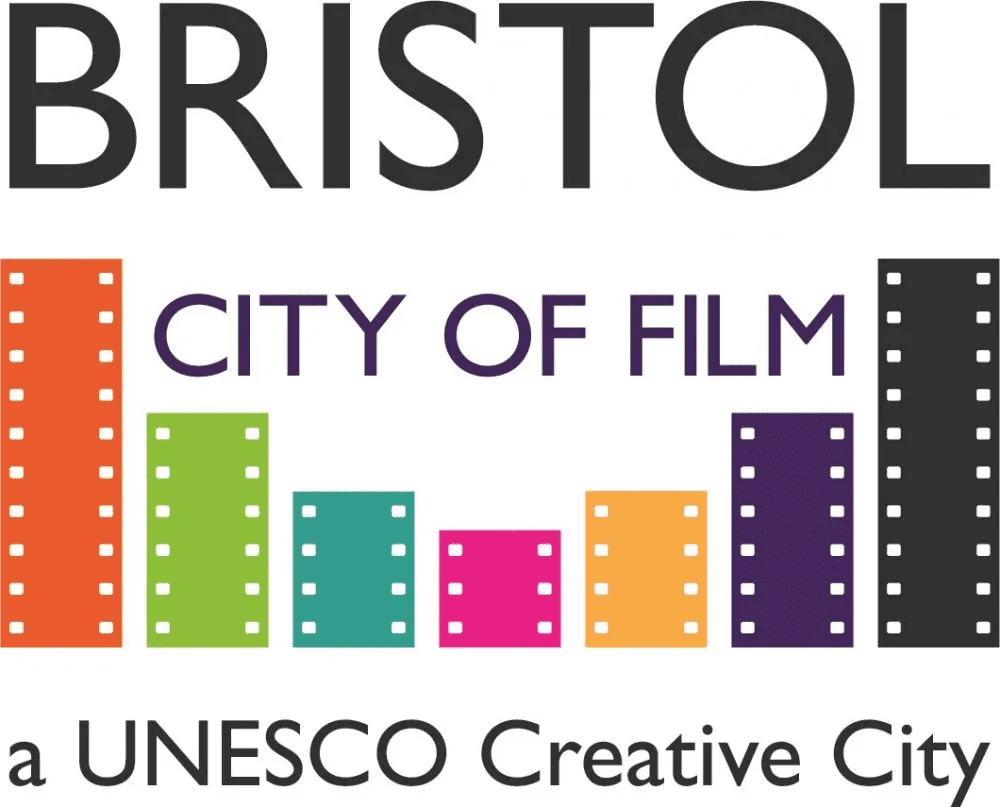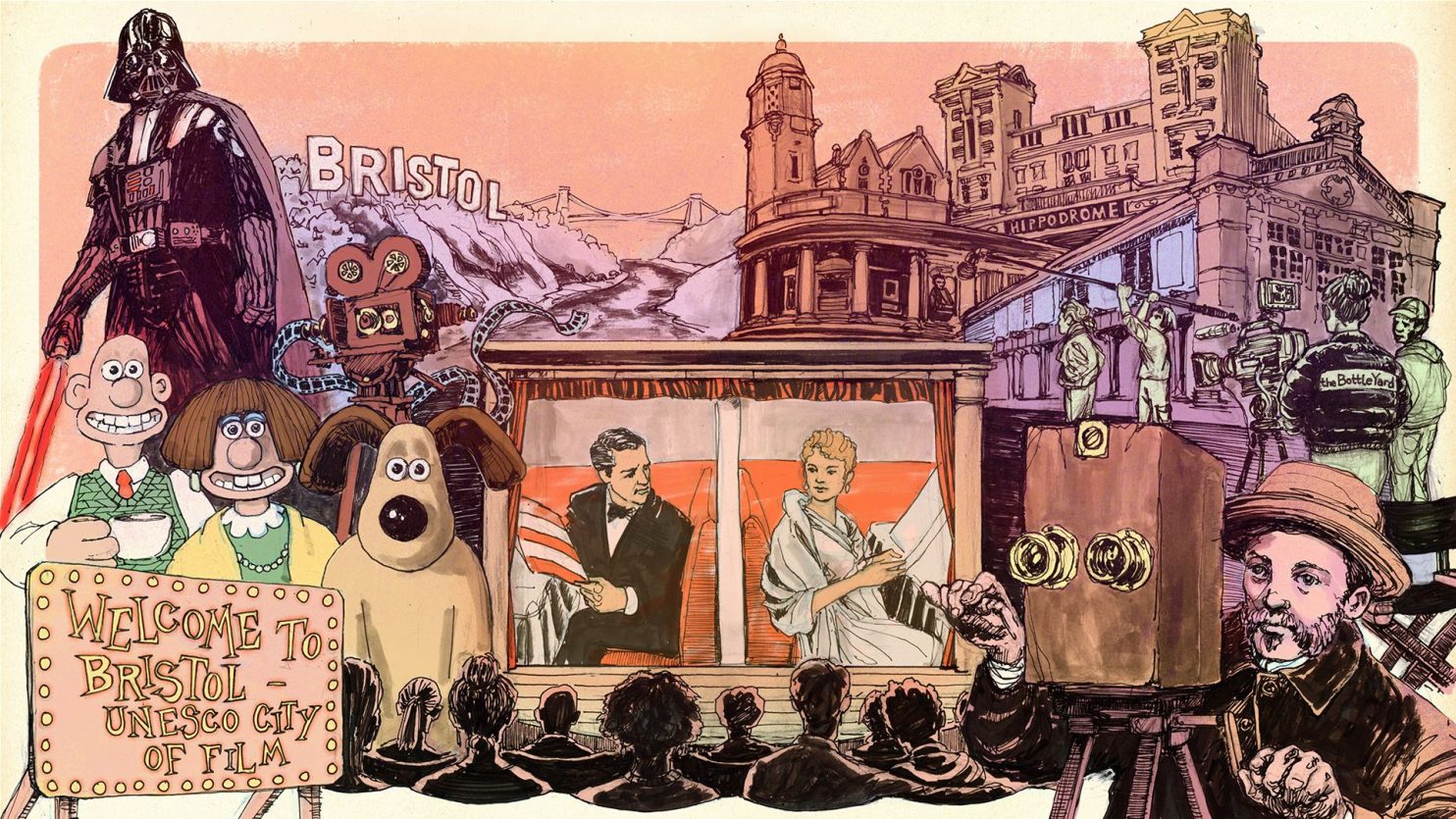
Illustration by Willem Hampson
Marking the centenary of the death of Bristolian inventor William Friese-Greene (1855-1921), a pioneer of early motion pictures, Film 2021 will include film screenings across the city, walking tours exploring cinema buildings, photography exhibitions, talks and panel discussions, and the launch of a special publication recounting the public’s memories of cinema-going throughout the past 70 years.
A special illustration (left) featuring some of Bristol’s best known film landmarks and figures including William Friese-Greene, has been produced for Film 2021 by Willem Hampson, freelance illustrator & UWE Bristol graduate.
Andrew Kelly, Director of Bristol Ideas, says: “For a long time, William Friese-Greene’s contribution to film had been dismissed. The centenary of his death is the perfect time to reassess his achievements as scholarship has revealed new material and Friese-Greene is now increasingly recognised as one of the pioneers of British cinema and a major figure in the early development of moving pictures. He was a fascinating individual who came from a working-class background into prominence in the world of science and he used that fame to promote the role of women in the field of photography, for example.”
“What better way to mark the achievements of Bristol’s film and moving image sector today than by shining the spotlight on a pioneer of the past who devised ground-breaking developments in motion picture technology,” says Bristol City of Film’s Natalie Moore. “The ripples of Friese-Green’s work were felt by the film industry in the UK and across the globe. With projects like the CAMERA Innovation Motion Capture Studio at The Bottle Yard now opening up possibilities of mo-cap technology to businesses, Bristol continues to break new ground today.”
Despite the pandemic causing a temporary standstill in film and TV production last year, Bristol has bounced back as a filming destination, with cameras rolling on a host of new titles at the city’s Bottle Yard Studio and at Bristol’s many locations managed by Bristol Film Office. Titles currently shooting include Amazon Studios spy thriller Alex Rider, Stephen Merchant’s BBC One/Amazon Prime co-production The Offenders starring Oscar-winner Christopher Walken and new Sky thriller Extinction starring breakthrough talent, Paapa Essideu.
Laura Aviles, Senior Bristol Film Manager responsible for The Bottle Yard Studios and Bristol Film Office says: “It’s heartening to see such strong levels of production in Bristol in the first quarter of 2021 after the challenges of 2020. Bristol Film Office is supporting multiple productions whilst Studio bookings are looking healthy well into 2022. We’re on track for realising The Bottle Yard Studios’ expansion plans, with a full business case now in development and £11.8m investment committed by the West of England Combined Authority to increase capacity from eight to 11 stages. This is great news considering that TV and film production is going to play a crucial role in driving employment and inward investment, as Bristol recovers from the effects of the pandemic.”
The pandemic has, however, had a longer lasting impact on the city’s exhibition and festival sector, with cinemas still temporarily closed and film festivals forced to either move activity online, postpone or in some cases, cancel. Many working within the creative industries, particularly freelancers, have faced the loss of work and little or no state support. Film 2021 hopes to welcome the safe return of audiences to cinemas and festivals, and to celebrate the skills and innovation of the region’s film professionals.
“Bristol is a great film city with a rich history in cinema and vibrant innovative future with the moving image,” says Mark Cosgrove, Watershed’s Cinema Curator and Founder of Cinema Rediscovered. “I’m looking forward to being able to welcome audiences back into Watershed and working with partners to bring new films and filmmaking talent from around the world to the city and explore the many strands of film culture through festivals like Cinema Rediscovered, Afrika Eye and Encounters.”
Film 2021 is backed by Bristol Film Office, The Bottle Yard Studios, Cary Comes Home, Bristol Photo Festival, Watershed, Destination Bristol, Bristol Libraries, Encounters, South West Silents and many others.
Follow Film 2021 on Twitter using the hashtag #BristolFilm2021 and on the Facebook page www.facebook.com/bristolfilm2021
About William Friese Green (1855-1921)

William Friese-Greene: Analysis of Motion Experiment c. 1886. Science Museum Group © The Board of Trustees of the Science Museum, London
In 1874 he married a German woman, Helena Friese, adding her name to his. In the ten subsequent years Friese-Greene went on to establish two studios in Bristol, one in Plymouth and another in Bath.
Friese-Greene and fellow inventor John Rudge collaborated to create magic lanterns that gave an illusion of movement by showing a series of photographic images in quick succession.
There is a plaque marking the location of Rudge’s home and a larger joint plaque for Rudge and Friese-Greene on the corner of New Bond Street Place, Bath. Friese-Greene is credited here as ‘the inventor of commercial kinematography being the first man to apply celluloid ribbon for this purpose’.
Around mid-1891, Friese-Greene filmed the street life outside the King’s Road studio. It is one of the earliest films shot of a London street currently known, pre-dating the films of Lumière, Edison, Birt Acres and Robert Paul by several years. There are eye-witness accounts from neighbours and colleagues of him projecting films in that basement workshop, including one of the street. From the late 1890s Friese-Greene was working on a variety of systems to create motion pictures in colour.
On 5 May 1921, Friese-Greene attended a meeting of film distributors to discuss the future of the British film industry. After giving a speech urging unity to an audience who had little idea who he was, he sat down and died of heart failure. At the time of his death the 1 shilling and 10 pence in his pocket was thought to be the only money he possessed. He was given a grand funeral, funded by the British film industry, and cinema projectors across the country were switched off for two minutes in tribute.
A highly imaginative film of his life and work, The Magic Box, was released in 1951 for the Festival of Britain. Martin Scorsese said: “the film that I think created the biggest impression on me about film and about filmmaking – the one that prompted me to say ‘maybe you could do this yourself’ – was The Magic Box.”

